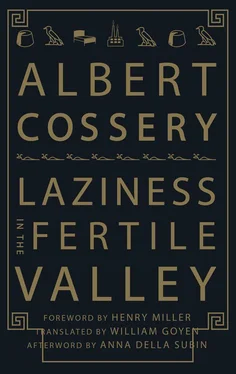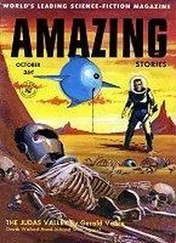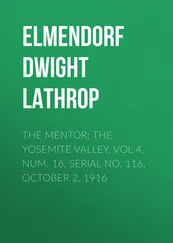Albert Cossery - Laziness in the Fertile Valley
Здесь есть возможность читать онлайн «Albert Cossery - Laziness in the Fertile Valley» весь текст электронной книги совершенно бесплатно (целиком полную версию без сокращений). В некоторых случаях можно слушать аудио, скачать через торрент в формате fb2 и присутствует краткое содержание. Год выпуска: 2013, Издательство: New Directions Publishing Corporation, Жанр: Современная проза, на английском языке. Описание произведения, (предисловие) а так же отзывы посетителей доступны на портале библиотеки ЛибКат.
- Название:Laziness in the Fertile Valley
- Автор:
- Издательство:New Directions Publishing Corporation
- Жанр:
- Год:2013
- ISBN:нет данных
- Рейтинг книги:3 / 5. Голосов: 1
-
Избранное:Добавить в избранное
- Отзывы:
-
Ваша оценка:
- 60
- 1
- 2
- 3
- 4
- 5
Laziness in the Fertile Valley: краткое содержание, описание и аннотация
Предлагаем к чтению аннотацию, описание, краткое содержание или предисловие (зависит от того, что написал сам автор книги «Laziness in the Fertile Valley»). Если вы не нашли необходимую информацию о книге — напишите в комментариях, мы постараемся отыскать её.
Laziness in the Fertile Valley — читать онлайн бесплатно полную книгу (весь текст) целиком
Ниже представлен текст книги, разбитый по страницам. Система сохранения места последней прочитанной страницы, позволяет с удобством читать онлайн бесплатно книгу «Laziness in the Fertile Valley», без необходимости каждый раз заново искать на чём Вы остановились. Поставьте закладку, и сможете в любой момент перейти на страницу, на которой закончили чтение.
Интервал:
Закладка:
“I know,” said Hoda, “He hasn’t only been waiting for Haga Zohra. Most of the time he’s waiting for me too.”
“Does that annoy you?” asked Serag. “He’s nice, Rafik. Why don’t you like him?”
“I only like you,” said Hoda. “And you’re mean to me.”
“I’m not mean,” said Serag. “I’m just thinking about other things.”
“What are you thinking about?” asked Hoda. “By Allah! You’re crazier than the others. I’m so unhappy!”
“Go away,” said Serag. “I have to leave. I’m late already.”
“Don’t go too far,” said Hoda.
She got up from the bed, smoothed her dress, and went out of the room silently.
Serag closed the gate to the garden and walked toward the highway. He was in a bad mood, felt weak, and cursed himself for giving in to this mood of Hoda’s. Now he didn’t have the energy to go as far as the factory; he’d have to put it off until another time. He realized that this girl was as pernicious to him as sleep. Her attachment for him was going to compromise his attempt for a free, industrious life. It was one more fetter to his dream of running away from his father’s house. How could he get free of her? Still, she was only a child, and Serag felt sorry for her. She was unhappy, he knew; she would be even more unhappy when he left.
Serag reached the highway; he had decided to go see Abou Zeid at his shop. He wished to submit several rather banal ideas to the peanut vendor that might give his mediocre business a lift. Thus, at least, his afternoon wouldn’t be entirely lost. It was warm, almost hot; Serag perspired and panted slightly, his eyes blinded by the glare. The sun burned everywhere, and the houses, on both sides of the road, seemed painted with large swaths of light. Serag was walking unsteadily, feeling as though he had ventured into an overwhelming brightness, full of invisible hazards. His hands felt damp in his pockets; he pulled them out and wiped them on his pants. Then he walked on, his arms swinging, his mind empty, his eyes fixed on the ground. He rarely met anyone on the road; it was too early. Serag was happy not to meet anyone. He didn’t want to talk, and then people always looked at him so strangely. They knew all his family, and smiled foolishly when they saw him coming. Serag was mortified every time. Suddenly he saw Mimi come out of an alley and hurry toward him, smiling. Mimi held his dog Semsen on a leash — a wretched animal, thin and dirty, that never left him.
“Hello,” said Mimi. “I haven’t seen you for a long time. How are you?”
“I don’t go out very much,” said Serag. “Are you taking a walk? How’s your dog?”
“He’s a dirty beast,” said Mimi. “He gives me a lot of trouble. Listen: I wanted to see you.”
“Really,” said Serag. “What about?”
“I wanted to talk to you,” said Mimi. “I’ve been wandering around your house every day hoping to see you. But I didn’t have any luck.”
“Is it very important?” asked Serag.
Mimi didn’t answer. He looked at Serag out of the corner of his eye, with a gleam of lust.
“Oh! it’s nothing very important,” he said. “I really just wanted to see you.”
“I’m glad I ran into you,” said Serag.
“Really?” asked Mimi.
“Of course,” said Serag. “I like your dog very much.”
“May I walk with you for a minute?” asked Mimi.
“Please do,” said Serag.
They began to walk along the side of the road, in the shade. Mimi held his head over his shoulder and smiled with ecstasy. He was still ogling Serag out of the corner of his eye. He was an odd young man, dressed with a studied elegance, with doubtful but refined manners. His plucked eyebrows and eyes darkened with grease gave him an equivocal, insinuating look. He walked daintily, lightly swinging his hips. From time to time he drew a handful of roasted watermelon seeds out of his jacket pocket and ate them with exquisite care.
“Would you like some?” he asked Serag.
“No thanks,” said Serag. “I don’t like them.”
“You should, they’re delicious. Unfortunately, they’re difficult to eat if one doesn’t know how to go about it.”
“I’ve never learned how to do it,” said Serag. “No one ever eats them at our house.”
“Yes, it’s not easy for you,” said Mimi. “You don’t ever dare try it. You probably only like what’s easy to eat. You don’t want to tire yourselves too much.”
“Oh no!” said Serag. “It’s just that no one likes them.”
“I understand,” said Mimi, “You don’t have to explain to me. And above all, don’t be angry about what I just said.”
“I’m not angry,” said Serag.
“Good,” said Mimi. “I’m so happy to have met you.”
He fluttered his eyelashes and smiled; he had beautiful red lips, rather full. Serag was terribly embarrassed. Mimi hadn’t yet explained why he had wanted to see him, but he knew him enough to guess the reason. He broke the silence:
“Do you still paint?”
“Yes,” said Mimi. “I even think I’ve succeeded in doing some extraordinary canvases. Someone wants to buy them; but I don’t want to sell.”
Mimi was a pupil at the Beaux Arts; he was going to be a painter and considered himself a great artist. No one had ever seen his paintings, but he claimed they were masterpieces. His family took him at his word; as for his many friends, they ridiculed him openly. In all the quarter he had a reputation for being rather bizarre, and for having his own unique morals.
“Did they offer you much money?” asked Serag.
“Of course,” said Mimi. “But I don’t care about money. I paint only for art.”
“That’s very beautiful,” said Serag. “You should be happy.”
“Only art interests me,” said Mimi. “That’s why I’m so interested in your family. You too, in your own way, are artists.”
“I don’t understand,” said Serag. “We aren’t artists, you’re mistaken. We don’t do anything at all.”
“But that’s just it,” said Mimi. “This strange idleness, in my opinion, is a supreme and distinguished art.”
“You’re very nice,” said Serag. “But I assure you, you’re mistaken. We’re not artists.”
Mimi was silent. He was content to have expressed himself. After some lectures on the Occident, he had formed a rather cloudy notion of modern aesthetics. His own ambiguous morals had the same origin. Mimi firmly believed that a true artist must be a pederast by nature. When a friend had asked him what he thought of the philosophy of a celebrated contemporary writer, Mimi had answered: “What do you want me to think? He’s a married man!” His reply had pleased him enormously. He would have loved to tell it to Serag, but he had never asked him. No matter! it would do for another time. He moved his tongue over his lips and smiled easily. He seemed to have lost himself entirely in his unwholesome reveries.
“Come here, you dirty little dog! Aren’t you ashamed — a
female.”
Semsen rubbed himself against Mimi’s legs, sheepish and docile. The female dog did not move from her place, watching the scene with rather vague astonishment. Mimi kissed Semsen, picked up a stone and threw it at the other dog. She leaped in the air and ran away without trying to understand what had happened. Semsen regretfully watched her leave. He suffered from his abnormal situation. He was a small mongrel with reddish hair and debauched eyes. He was not a pederast by his own taste, but only for fear of displeasing his master. Mimi punished him brutally each time he approached a female. Semsen was resigned to his lot. His desire to follow his normal instinct seemed like a tragic error to him, since it always brought him blows and insults.
Читать дальшеИнтервал:
Закладка:
Похожие книги на «Laziness in the Fertile Valley»
Представляем Вашему вниманию похожие книги на «Laziness in the Fertile Valley» списком для выбора. Мы отобрали схожую по названию и смыслу литературу в надежде предоставить читателям больше вариантов отыскать новые, интересные, ещё непрочитанные произведения.
Обсуждение, отзывы о книге «Laziness in the Fertile Valley» и просто собственные мнения читателей. Оставьте ваши комментарии, напишите, что Вы думаете о произведении, его смысле или главных героях. Укажите что конкретно понравилось, а что нет, и почему Вы так считаете.












